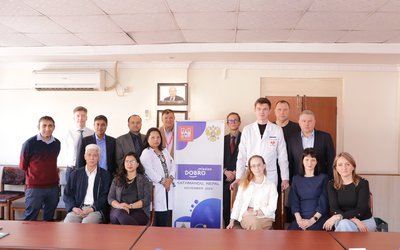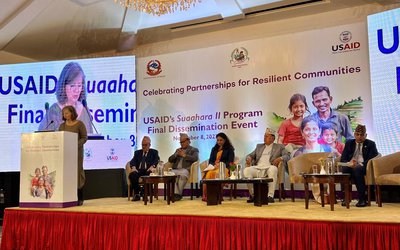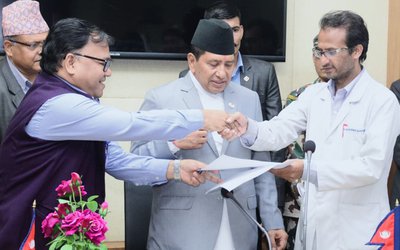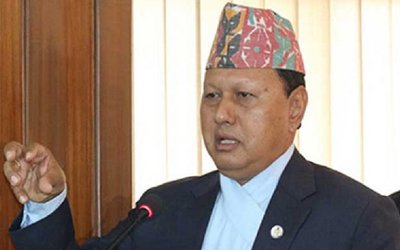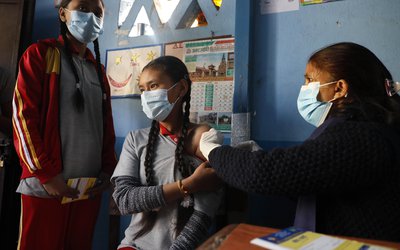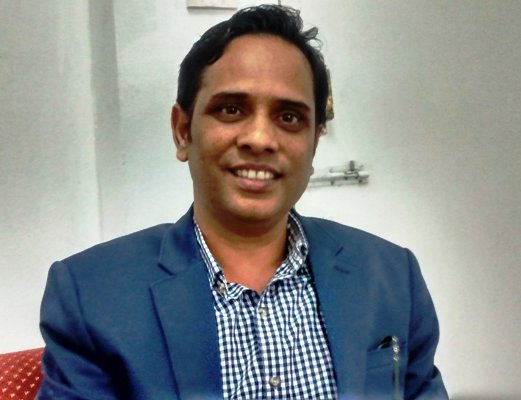
How do you see the state of malnutrition in Nepal?
Nepal is one of the countries in the world with rampant prevalence of malnutrition. Even today malnutrition is a cause of death of 45 percent of children under five. Some 37 percent of children are suffering from stunting, there are deficiencies of many nutritional items among the pregnant women and children under five. There is the need of adequate investment as well as raising the awareness for the health of population. This knowledge has to go from generation to generation. If you are malnourished, you cannot produce healthy children and even cannot find a healthy spouse. There is the need to reduce malnutrition among children to reduce the child death. It also affects the earning of the people. People who suffer from malnutrition make less money than the healthy ones. If you are not healthy, you are less productive.
How are you launching the program?
It is a multi-stakeholder issue. In the past, it used to be a program under the Ministry of Health. There are several factors that make people healthy. Water, sanitation, nutrient foods, green vegatables, and so on. Providing them includes all stakeholders. Consumers, food habits, health, education -- it is a crosscutting issue.
How do you see MSNP?
This is the reason the government has implemented the Multi-Stakeholders Nutrition Plan (MSNP). This five year program will end by 2017. We have been launching the program for nutrition. As part of the nationwide nutrition campaign, the government has been implementing MSNP. Before preparing MSNP, the government launched a nationwide study and identified that 28 districts are badly affected in terms of nutrition. NPC is now focusing on these districts. This is the third year of plan and we have already implemented it in 16 districts and we will expand it in 12 districts from the coming fiscal year.
How much priority is given to the nutrition policy?
Nutrition is also part of the president's policy statement and finance minsiter’s budget statement. This has never happened in the past. We are increasing the political ownership. This campaign also includes SunaulaHazardin (Golden one thousand days). This shows that the government has given the high priority to eradicate the nutrition.
What is the stage of MSNP?
We have been implementing the MSNP in 28 districts with support from UNICEF and other donor countries. We are also conducting training for that. With the involvement of eight ministries, including Ministry of Sanitation and Drinking Water, Education, Health, Local Development and Federal Affairs, Ministry of Agriculture, Livestock, we have been conducting the training of trainers. We have also invited the local political leaders and officials from the ministries. Our aim is that nutrition issue should be included in 14 stages of development process of the government. We are embedding it from the top to the grass-root levels. We want to hit where malnutrition prevails at the highest rate, in the remote areas, among the poor and illiterate. Malnutrition is highly prevalent in the areas where there is rampant poverty.
What is your observation from the work so far?
Our experiences have also shown that without the involvement of political leadership, it is impossible to reduce malnutrition. We provided training for the Members of Parliament representing the 28 districts. Initially, they opposed the training. However, they realized how malnutrition has been affecting their districts and how HDI is lower in these districts. It is said that investing one dollar in nutrition generates 16 dollars in return. It has multiplier effects. The report prepared by the World Bank in 2005 has showed that the number of malnourished population even has impact in the GDP growth up to 3 to 5 percent. Highest the level of malnutrition relates with the lowest the number of GDP.
How about your training to MPs?
MPs have realized the urgency of the need to address the issue. From stopping the open defecation to encouraging the rural household to grow more nutrient foods in house gardens, there are so many basic things involved. From VDC level to DDC level, nutrition needs to be incorporated in the planning process. We also need to create the awareness that people have to stop exchanging noodles with milk and other nutrient products produced in the home. MPs expressed their satisfaction at the end to know the overall scenario.
How do you look the 'Golden one thousand days' program?
One of the major components of MSNP is 'Golden one thousand days'. This includes the day of conceiving of the child up to nine months and then another one and a half years, which add up to one thousand days. During this period, all the growth of the children takes place. Most importantly, one and a half years after birth are very crucial for physical and mental growth. This is the period to nurture your child offering him/ her quality and healthy food. Feeding nutrient foods. That is why it is called golden days.
What is the status of the program now?
Last April, we launched the 'golden' days national campaign. We also appointed ParasKhadka, national cricket captain, as our nutrition ambassador. He will be with us in national campaigns. He will teach the importance of nutrition. To make our campaign more effective, we have started to air tele-serials which will be broadcast nationwide. We also organized a training program for journalists. We have invited journalists from different media houses. We are assessing the program now. We are launching more programs with nutrition focus. UN has already declared the decade is a decade on action on nutrition. The SDGs have also given the high priority for nutrition. This is a global agenda now. Nutrition is a highly focused area. For the development of the country, you need healthy people who have a lot of chances for improvement.
How do you see the budget allocation for nutrition?
We have started to track the budget now. This is going to help us for better planning for nutrition programs including identifying the gaps, and negotiations with the Ministry of Finance in case of lower budget allocations. As Nepal has chosen a multi-sectoral approach to implement the nutrition program, it is necessary to track down the budget allocated to different ministries.
Why is there the need to track the budget?
It is essential to look at the total budget allocations. We will track the budget identified by Common Action Framework. These include nutrition specific, nutrition sensitive and governance related headings. As we have seen duplications in the budget, there is the need to minimize the duplication to maximize the results.
How is it helping?
It is helping us a lot. It is helping us to measure the resources pie and channel nutrition budget accordingly. Despite out efforts, it is still difficult to track actual financial resources for the sector due to a lack of specific budget code for MSNP.
How do you see the support of Nepal’s development partners in this?
As nutrition is key and one of the major issues attached to SDGs, Nepal’s development partners are coming to us to support or program. USAID has been supporting the One Thousand Golden Days, UNICEF and European Union and other development partners, NGOs and INGOs are also supporting us. As a major agenda for development, the government is giving high priority to the sector.
- TANAHU HYDROPOWER PROEJCT: A Significant Achievement
- Apr 15, 2024
- AMBASSADOR HANAN GODAR: Sharing Pain With A Nepali Family
- Mar 30, 2024
- VISIT OF KfW AND EIB TO NEPAL : Mission Matters
- Mar 25, 2024
- NEPAL BRITAIN SOCIETY: Pratima Pande's Leadership
- Mar 24, 2024
- NEPAL ARMY DAY: Time To Recall Glory
- Mar 15, 2024


